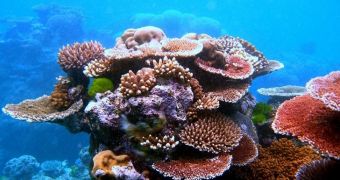In a paper published in the journal Science this past April 24, a team of researchers working with the Stanford University in the United States explains that, according to evidence at hand, some corals have the ability to adjust to rising ocean temperatures.
The scientists argue that, all things considered, this might help them survive the changes that global warming and climate change are bound to bring about in their environment.
In their paper, the Stanford University researchers detail that, as shown by several previous studies, coral reefs not only provide homes for many fish species, but also support aquaculture and provide protection against storms.
They further detail that, over the past twenty years, some 50% of the world's reef-building corals have been destroyed by overfishing, pollution, excessive heat, and an increase in the acidity of oceanic waters. As climate change continues to warm our oceans, several coral species risk going extinct.
The good news is that, by the looks of it, some corals are perfectly capable of altering their internal functions to such an extent that they become able to cope with hot water about 50 times faster than it would take them to develop this ability by means of evolutionary change alone.
“The temperature of coral reefs is variable, so it stands to reason that corals should have some capacity to respond to different heat levels. Our study shows they can, and it may help them in the future as the ocean warms,” Professor Steve Palumbi said in a statement.
As part of their investigation, the Stanford University researchers moved coral colonies from a warm pool to a nearby cool one, and vice versa. They then kept a close eye on the aquatic organisms, and focused on how they responded to the changes in temperature that they had been exposed to.
It was thus discovered that, when transplanted into a hot environment, the corals originating from the cool pool switched on and off certain genes, and eventually became more heat-tolerant. Granted, their tolerance to heat was about half the one documented in the case of corals that lived in the hot pool to begin with, but the achievement was pretty impressive.
“These results tell us that both nature and nurture play a role in deciding how heat-tolerant a coral colony is. Nurture, the effect of environment, can change heat tolerance much more quickly – within the lifetime of one coral rather than over many generations,” Professor Steve Palumbi summed up the findings of this investigation.
The scientists who worked on this research project wish to stress that, although their findings indicate that at least some corals can adapt to increasing ocean temperatures, the fact remains that marine ecosystems are also threatened by pollution and acidification, and that these other stressors are likely to prove too much for corals to handle.

 14 DAY TRIAL //
14 DAY TRIAL //